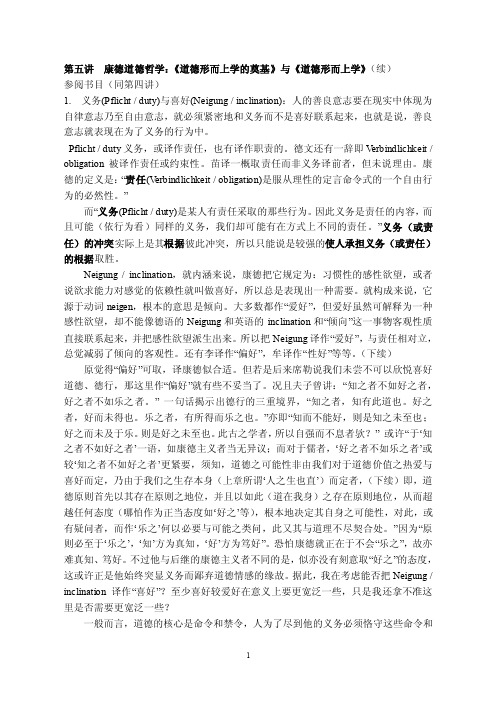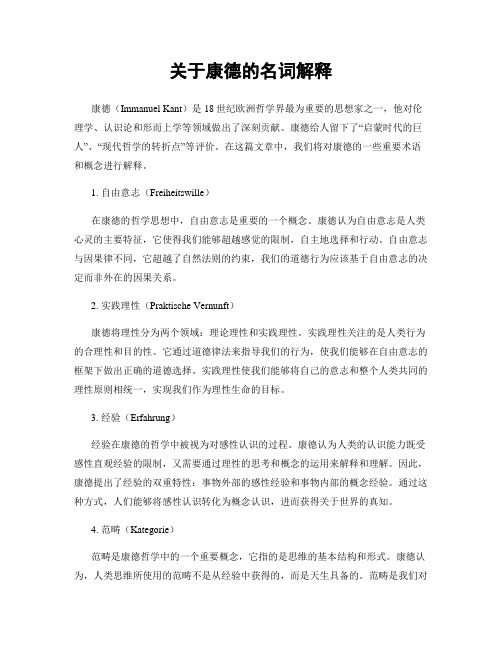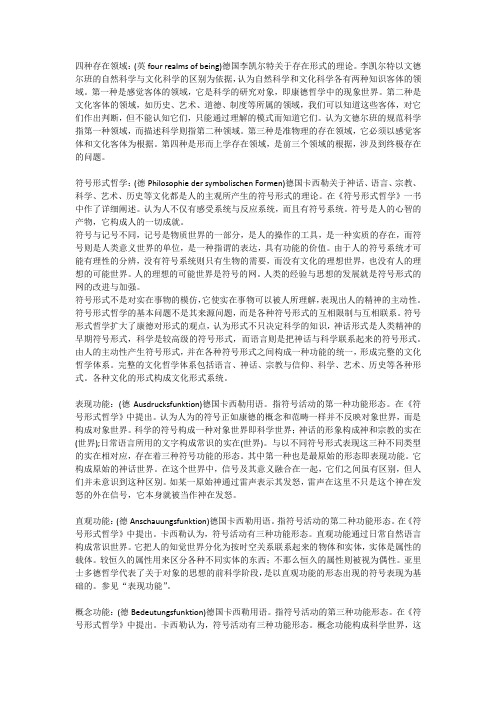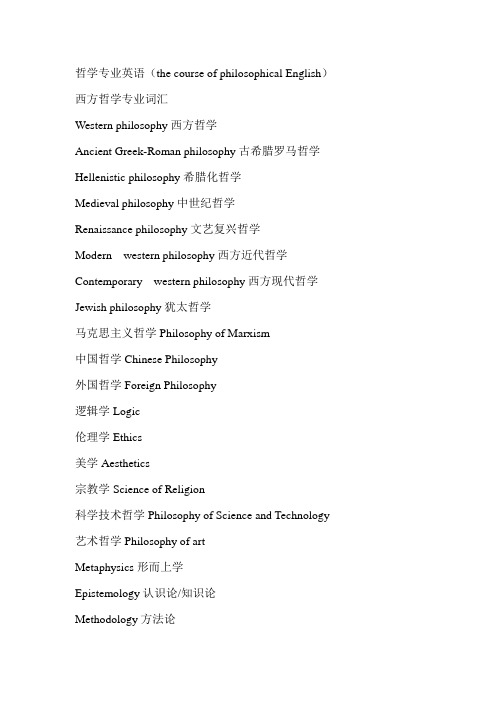康德哲学术语表(英文)
第五讲康德道德哲学

第五讲康德道德哲学:《道德形而上学的奠基》与《道德形而上学》(续)参阅书目(同第四讲)1. 义务(Pflicht / duty)与喜好(Neigung / inclination):人的善良意志要在现实中体现为自律意志乃至自由意志,就必须紧密地和义务而不是喜好联系起来,也就是说,善良意志就表现在为了义务的行为中。
Pflicht / duty义务,或译作责任,也有译作职责的。
德文还有一辞即V erbindlichkeit / obligation 被译作责任或约束性。
苗译一概取责任而非义务译前者,但未说理由。
康德的定义是:“责任(V erbindlichkeit / obligation)是服从理性的定言命令式的一个自由行为的必然性。
”而“义务(Pflicht / duty)是某人有责任采取的那些行为。
因此义务是责任的内容,而且可能(依行为看)同样的义务,我们却可能有在方式上不同的责任。
”义务(或责任)的冲突实际上是其根据彼此冲突,所以只能说是较强的使人承担义务(或责任)的根据取胜。
Neigung / inclination,就内涵来说,康德把它规定为:习惯性的感性欲望,或者说欲求能力对感觉的依赖性就叫做喜好,所以总是表现出一种需要。
就构成来说,它源于动词neigen,根本的意思是倾向。
大多数都作“爱好”,但爱好虽然可解释为一种感性欲望,却不能像德语的Neigung和英语的inclination和“倾向”这一事物客观性质直接联系起来,并把感性欲望派生出来。
所以把Neigung译作“爱好”,与责任相对立,总觉减弱了倾向的客观性。
还有李译作“偏好”,牟译作“性好”等等。
(下续)原觉得“偏好”可取,译康德似合适。
但若是后来席勒说我们未尝不可以欣悦喜好道德、德行,那这里作“偏好”就有些不妥当了。
况且夫子曾讲:“知之者不如好之者,好之者不如乐之者。
”一句话揭示出德行的三重境界,“知之者,知有此道也。
好之者,好而未得也。
中英文对照:现代西方哲学重要概念和人名

中英文对照:现代西方哲学重要概念和人名现代西方哲学 Contemporary Western Philosophy一、实证主义 Positivismte孔德l穆勒:归纳主义inductismH.Spencer斯宾塞二、非理性主义和唯意志主义 Irrationalism and VoluntarismSchopenhauer叔本华Kierkegaard克尔凯郭尔F.W.Nietzsche尼采三、新康德主义 Neo-kantianismMarburg马堡学派:H.Cohen柯亨Freiburg西南学派:W.Winderband文德尔班四、马赫主义 MachismE.Mach马赫:要素一元论Elementary MonismR.Avenarius阿芬那留斯H.Poincare彭加勒:约定论Conventionism五、生命哲学 The Philosophy of LifeH.Bergson 柏格森六、新黑格尔主义 Neo-hegelianismRoyce罗伊斯七、实用主义PragmatismPeirce皮尔士James詹姆士Dewey杜威八、20世纪的实在主义思潮 Realism九、分析哲学(上) Analytic PhilosophyFreg 弗雷格Russell罗素Wittgenstein维特根斯坦Logic Empiricism逻辑实证主义:Carnap卡尔纳普十、分析哲学(下)Ordinary Language Analytic Philosophy日常语言分析哲学:Ryle赖尔、Austin奥斯汀、Strawson斯特拉森Quine蒯因Kripke 克里普克十一、现象学 PhenomenologyBrentano布伦塔诺Husserl胡塞尔:心理主义Psychologism、意向性Intentionality、生活世界Life-World十二、存在主义 ExistentialismHeidegger海德格尔Jaspers雅思贝尔斯Sartre萨特十三、哲学人类学和人类文化哲学Anthropology and Human CultureScheler舍勒Cassirer卡西尔十四、结构主义与后结构主义Structuralism and Post-StructuralismSaussure索绪尔Levi-Strauss列维-斯特拉斯Althusser阿尔图塞Lacan拉康Barthe巴尔特Derrida德里达:解构主义DeconstructionismFoucault福柯十五、弗洛伊德主义 FreudianismFreud弗洛伊德Adler阿德勒十六、法兰克福学派 Frankford SchoolHorkheimer霍克海默Adorno阿多诺Habermas哈贝马斯十七、哲学释义学 Philosophical Hermeneutics Gadamer伽达默尔Ricoeur利科十八、当代西方科学哲学 Scientific PhilosophyPopper波普尔Lakatos拉卡托斯Kuhn库恩Feyerabend费耶阿本德Lauden劳丹十九、西方宗教哲学Maritain马利坦Bowne鲍恩Mounier穆尼埃:人格主义PersonalismTillich蒂里希二十、当代西方哲学的发展趋势与后现代主义Rorty罗蒂Postmodernism后现代主义其他Universals共相Übermensch超人Truth-functions真值函项Transcendentialism先验论Syllogisms三段论Acquaintance亲知Verifiability可证实性Utilitarianism功利主义Agnosticism不可知论Being-in-itself自在之物Naturalism自然主义Alethia真理Coherentism融贯论Essence本质Angst畏Empiricism经验主义Foundationalism基础主义Appearance表象、现象Cognition认知Space-time时空Apperception统觉Epistemology认识论Sense and meaning意义和意谓Consciousness意识Solipsism唯我主义Intuitionism直觉主义Context principle语境原则Inductive and deductive归纳和演绎LEM排中律Atomism原子论Cosmology宇宙论Rejection of对…的排斥Materialism唯物主义Idealism唯心主义Means-end目的与手段Reductionism还原主义Define description限定摹状词State of affairs事态Emotivism情感主义Durance/duration绵延Self-explanatory自明的Perception知觉Verification principle证实原则。
关于康德的名词解释

关于康德的名词解释康德(Immanuel Kant)是18世纪欧洲哲学界最为重要的思想家之一,他对伦理学、认识论和形而上学等领域做出了深刻贡献。
康德给人留下了“启蒙时代的巨人”、“现代哲学的转折点”等评价。
在这篇文章中,我们将对康德的一些重要术语和概念进行解释。
1. 自由意志(Freiheitswille)在康德的哲学思想中,自由意志是重要的一个概念。
康德认为自由意志是人类心灵的主要特征,它使得我们能够超越感觉的限制,自主地选择和行动。
自由意志与因果律不同,它超越了自然法则的约束,我们的道德行为应该基于自由意志的决定而非外在的因果关系。
2. 实践理性(Praktische Vernunft)康德将理性分为两个领域:理论理性和实践理性。
实践理性关注的是人类行为的合理性和目的性。
它通过道德律法来指导我们的行为,使我们能够在自由意志的框架下做出正确的道德选择。
实践理性使我们能够将自己的意志和整个人类共同的理性原则相统一,实现我们作为理性生命的目标。
3. 经验(Erfahrung)经验在康德的哲学中被视为对感性认识的过程。
康德认为人类的认识能力既受感性直观经验的限制,又需要通过理性的思考和概念的运用来解释和理解。
因此,康德提出了经验的双重特性:事物外部的感性经验和事物内部的概念经验。
通过这种方式,人们能够将感性认识转化为概念认识,进而获得关于世界的真知。
4. 范畴(Kategorie)范畴是康德哲学中的一个重要概念,它指的是思维的基本结构和形式。
康德认为,人类思维所使用的范畴不是从经验中获得的,而是天生具备的。
范畴是我们对世界所进行的认识和理解过程中的先验条件,它们帮助我们将感性经验整合为有意义的概念。
5. 纯粹理性(Reine Vernunft)纯粹理性是康德哲学中一个关键的概念。
康德将理性分为纯粹理性和实践理性两个领域。
纯粹理性关注的是通过纯粹概念来了解事物本质和实在性。
康德认为通过纯粹理性,我们可以超越感性直观和经验的限制,探求人类认识的极限,但也认识到我们无法获得事物的本质理解,我们只能通过现象层面来认识世界。
新康德主义哲学术语(7)

四种存在领域:(英four realms of being)德国李凯尔特关于存在形式的理论。
李凯尔特以文德尔班的自然科学与文化科学的区别为依据,认为自然科学和文化科学各有两种知识客体的领域。
第一种是感觉客体的领域,它是科学的研究对象,即康德哲学中的现象世界。
第二种是文化客体的领域,如历史、艺术、道德、制度等所属的领域,我们可以知道这些客体,对它们作出判断,但不能认知它们,只能通过理解的模式而知道它们。
认为文德尔班的规范科学指第一种领域,而描述科学则指第二种领域。
第三种是准物理的存在领域,它必须以感觉客体和文化客体为根据。
第四种是形而上学存在领域,是前三个领域的根据,涉及到终极存在的问题。
符号形式哲学:(德Philosophie der symbolischen Formen)德国卡西勒关于神话、语言、宗教、科学、艺术、历史等文化都是人的主观所产生的符号形式的理论。
在《符号形式哲学》一书中作了详细阐述。
认为人不仅有感受系统与反应系统,而且有符号系统。
符号是人的心智的产物,它构成人的一切成就。
符号与记号不同,记号是物质世界的一部分,是人的操作的工具,是一种实质的存在,而符号则是人类意义世界的单位,是一种指谓的表达,具有功能的价值。
由于人的符号系统才可能有理性的分辨,没有符号系统则只有生物的需要,而没有文化的理想世界,也没有人的理想的可能世界。
人的理想的可能世界是符号的网。
人类的经验与思想的发展就是符号形式的网的改进与加强。
符号形式不是对实在事物的模仿,它使实在事物可以被人所理解,表现出人的精神的主动性。
符号形式哲学的基本问题不是其来源问题,而是各种符号形式的互相限制与互相联系。
符号形式哲学扩大了康德对形式的观点,认为形式不只决定科学的知识,神话形式是人类精神的早期符号形式,科学是较高级的符号形式,而语言则是把神话与科学联系起来的符号形式。
由人的主动性产生符号形式,并在各种符号形式之间构成一种功能的统一,形成完整的文化哲学体系。
新康德主义哲学术语(3)

纯粹思维创造论:(德Schopfung der reinen Denkens)新康德主义马堡学派关于存在和认识关系的理论。
该派发挥康德哲学中的先验逻辑倾向,使之成为一种独特的哲学方法,即先验方法。
认为科学事实、存在是意识、思维的不断创造的发展过程,据此否定康德“自在之物”的客观意义,认为它是人为自己的认识所设定的不可逾越的界限的概念,即极限概念。
全部认识均是纯粹思维本身的活动。
感觉和知觉都不是纯粹的,都必有思维参与其中。
感性直观不是思维以外的、异于思维的东西,它们本身就是思维。
空间和时间不是感性的先天形式,而是纯粹思维活动的结果。
思维的对象、自然界也是由思维所规定的。
认识和思维的过程同时又是创造其对象、自然界即存在的过程。
思维是本原性的、纯粹的、没有任何东西给予它的,它的一切均由它自己创造和设定,它既创造了对象世界的形式,又创造它的内容。
一切事物的实在性,均可还原为作为纯粹思维的产物的无穷小概念的实在性。
全部知识和科学体系均被认为以无穷小概念为本原。
但无穷小概念及其他数学概念不是物,也不是精神实体,而是纯粹思维借以建立某一体系的成分、环节。
纯粹思维的创造作用,并不是指纯粹思维从精神实体中派生出物质实体,而是指在把一切对象及它们之间关系还原为数量关系的基础上,把它们当作纯粹思维所建立的系统中的成分、环节。
新批判主义:(英neo-criticism)法国雷诺维叶遵循德国康德批判哲学精神提出的关于解决人的认识问题的理论。
认为哲学应当与科学一样,从现象的研究开始。
认为康德的错误在于不能在经验的范围内进行研究,而分裂先验的主体与自在之物。
如果否定自在之物,集中于经验,则可以把认识的表象分为两方面,即表象作用与表象的对象,两者实为经验的两方面即某物的经验与经验中的某物。
实在主义与观念主义分别坚持一方面,忽视另一方面,陷于片面的了解。
新批判主义以批判方法承认经验为唯一对象,发现经验中的原则与范畴。
认为经验中的原则与范畴有九个:即关系、数量、广延、绵延、性质、变化、因果、目的、人性,而以关系为最普遍、最客观,其余的则依次更为具体、更为主观。
哲学专业英语词汇

哲学专业英语(the course of philosophical English)西方哲学专业词汇Western philosophy西方哲学Ancient Greek-Roman philosophy古希腊罗马哲学Hellenistic philosophy希腊化哲学Medieval philosophy中世纪哲学Renaissance philosophy文艺复兴哲学Modern western philosophy西方近代哲学Contemporary western philosophy西方现代哲学Jewish philosophy犹太哲学马克思主义哲学Philosophy of Marxism中国哲学Chinese Philosophy外国哲学Foreign Philosophy逻辑学Logic伦理学Ethics美学Aesthetics宗教学Science of Religion科学技术哲学Philosophy of Science and Technology 艺术哲学Philosophy of artMetaphysics形而上学Epistemology认识论/知识论Methodology方法论ontology本体论Cosmology宇宙论/宇宙生成论Theory of value/axiology价值论Monism一元论Dualism二元论Pluralism多元论Cognosciblism可知论Agnosticism不可知论Materialism唯物主义Irrationalism非理性主义abstract/concrete抽象/具体Idealism唯心主义Objective /Subjective idealism客/主观唯心主义Scepticism怀疑主义Substance实体macrocosm大宇宙microcosm小宇宙Sensibility/understanding/ reason感性/知性/理性Theism有神论Antitheism 无神论Deism自然神论pantheism泛神论Dialectical materialism辩证唯物主义Historical materialism历史唯物主义Law of identity同一律Law of contradiction排中律Law of excluded middle排中律teleology目的论mechanism机械论dialectics辩证法consciousness意识spirit精神belief信念nature自然reality现实,实在possibility可能性Illusion幻想imagination想象力Mysticism神秘主义Spiritualism唯灵论form形式existence存在appearance现象essence本质prime matter原初质料motion运动Continuity/non-Continuity连续性/间断性time and space时间与空间Past-present-future过去/现在/未来cause and effect原因与结果subject and object主体与客体occasionalism偶因论Ockham’s razor奥康剃刀subjectivity主体性Necessity and contingency必然性与偶然性Universals and individuals个别与一般/共相与殊相/普遍与个别relative and absolute相对与绝对intuition直觉idea观念thought思维perception知觉subsistence潜在knowledge知识opinion意见Nature自然Actuality/reality现实Reality实在Necessity and freedom必然与自由Beginning/first principle/arche(希)本原,始基archetype原型illusion幻象image形像,影像ideology意识形态doctrine of correspondence符合说mind-body problem身心问题representative theory of idea表象说finite and infinite有限与无限humanism人道主义,人文主义Natural theology自然神学substratum基质The infinite/boundless/apeiron无定/无限pneuma普纽玛being存在non-being非存在logos逻各斯mind/nous努斯psyche/pneuma普纽玛atom原子void虚空element元素four roots四根self-knowledge自知Becoming/decay生成/衰亡bisection两分法flying arrow is at rest飞矢不动stadium运动场becoming生成doctrine of effluence流射说Eristic/elenchus论辩术,诡辩术art of midwifery/maieutic method助产术/接生术irony讥讽Virtue is knowledge美德即知识world of idea理念世界Infinite regress argument无穷后退证明Simile of the cave洞穴喻Simile of the line线段喻Simile of the sun太阳喻sense world感性世界,感官世界harmony和谐theory of Participation(sharing)分有说theory of Imitation模仿说copy摹本archetype模型,原型paradigm范式model of universal宇宙模型,世界模型soul of universal宇宙灵魂,世界灵魂Philosopher-king哲学王passion激情Wisdom/courage/temperance/justice智慧/勇敢/节制/正义(four cardinal virtue四主德)Desire/passion欲望/激情artificer工匠,创造者Genus种primary/secondary substance第一、二实体form and matter形式与质料accident偶性potentiality and actuality潜能与现实four causes 四因material cause质料因formal cause形式因efficient cause动力因final cause目的因ether以太Actuality现实/entelechy隐德莱希(完全实现)Good/highest good善/至善Category范畴Peripatetics漫步学派active reason/active intellect主动理性/主动理智mean中道,中庸wisdom智慧Practical wisdom实践智慧intellectual virtue理智德性the liar说谎者argument of the measure of grain谷堆论证argument of the baldhead秃头论证argument of the veiled figure隐藏者论证logos of the universe宇宙理性one太一What-it-is 是什么the third man argument第三者论证Theory of recollection回忆说epoche悬搁判断==judgement of suspension ataraxy静观doctrine of emanation流溢说anthropomorphism神人同形同性论=拟人观pythagoreanism毕达哥拉斯主义transmigration of souls灵魂轮回转世说atomism原子论Mode of cyclical reasoning循环论证Good being nature善即自然sensation was due to action between the unlikes异类相知说doctrine of like knows like同类相知说doctrine of seeds种子说Doctrine of love and strife爱恨说doctrine of image影像说cynicism犬儒主义platonism柏拉图主义theory of idea理念论doctrine of the communion of genera通种论aristotelianism亚里士多德主义syllogism三段论Unmoved mover不动的动者==prime moverpurification净化说induction归纳法pyrrhonism皮浪主义Epicureanism伊壁鸠鲁主义canonic准则学Ionian school伊奥尼亚学派Milesian school米利都学派Ephsian school爱菲斯学派Heraclitean school赫拉克利特学派Pythagoreans 毕达哥拉斯学派Eleatic school爱利亚学派privation缺失,匮乏Presocratics前苏格拉底学派Cynics犬儒学派Cyrenaics昔兰尼学派megarian school麦加拉派sophists智者Minor socratics小苏格拉底学派academy学园/柏拉图学园/雅典学园academics学园派peripatetics漫步学派stoics画廊学派/斯多亚学派Epicurean school伊壁鸠鲁学派Christianity基督教Christian philosophy基督教哲学Judaism犹太教Trinity三位一体heresy异端Polytheism多神论eschatology末世论Church fathers教父Providence天意,天命Kingdom of God上帝之国theology神学negative theology否定神学Positive theology肯定神学Patristic philosophy/ Patristics教父哲学/教父学scholasticism经院哲学revealed religion天启宗教,启示宗教Trinity三位一体incarnation道成肉身faith/hope/love信仰/希望/热爱doctrine of redemption救赎论grace神恩,神惠,恩宠omnipotence全能omniscience全知omnipresence全在Argument a posteriori先天证明Argument a priori后天证明fideism信仰主义(僧侣主义)hylozoism物活论Original sin 原罪Justification by faith因信称义Ockham’s razor奥卡姆剃刀nominalism唯名论(extreme/moderate)realism唯实论(extreme/moderate )Augustinism奥古斯丁主义ontological argument本体论证明cosmological argument宇宙论证明teleological argument目的论证明Moral argument道德论证明Supreme good argument至善性证明Faith hope and charity信望爱doctrine of double-truth双重真理论Divine illumination神的光照Theological fatalism神学预定论Thomism托马斯主义Averroism阿威洛伊主义Scotism司各脱主义Rationalism唯理论(materialistic/idealistic )Empiricism经验论(materialistic/idealistic)Social contract theory社会契约论Geographical determinism地理环境决定论Classical German philosophy德国古典哲学Apriorism先天论The reformation宗教改革运动Enlightenment启蒙运动French materialism法国唯物主义Encyclopaedists百科全书派conceptualism概念论Mechanistic materialism机械唯物论learned ignorance有学问的无知maximum极大minimum极小utopia乌托邦universal intellect普遍理智idols假相,偶像theory of four idols四假相说idols of the tribe种族假相idols of the cave洞穴假相idols of the market-place市场假相idols of the theatre剧场假相property and form性质与形式extension广延first principle第一原理Real/nominal essence实在/名义本质blank tablet白板causality因果性causation因果关系cause原因/effect结果experience经验dogma教条Material/Spiritual substance物质/精神实体thinking substance思想实体,思维实体Innate idea天赋观念adventitious ideas外来观念factitious ideas虚幻观念dualism of mind and matter心物二元论Animal sprits精气,元精,动物精神psycho-physical interactionism身心交感论pineal gland松果腺extensive substance广延实体the theory of social contrast社会契约论Association of idea观念的联结(休谟)Cartesianists笛卡儿主义者theory of substance实体论theory of attribute属性论theory of mode样式论(finite/infinite)psycho-physical parallelism心物平行论true idea真观念attribute属性Spinozism斯宾诺莎主义experience经验(external/internal)sensation and reflection感觉与反省abstraction抽象作用abstract idea抽象观念Simple/complex idea简单/复杂观念Immaterialism非物质主义personal identity人格同一性contiguity接近性(休谟)Divine right of kings君权神授说school of continental Rationalism大陆理性派British empirists英国经验派Cambridge platonism 剑桥柏拉图主义Scottish school of common sense苏格兰常识学派Old Hegelians老年黑格尔派Young Hegelians青年黑格尔派Right Hegelians黑格尔右派Left Hegelians黑格尔左派Speculative philosophy 思辨哲学Three tables三表法Table of essence/presence本质表/具有表Table of absence of proximity接近中的缺乏表Table of degree/comparison程度表/比较表Relative/finite substance相对的或有限的实体Absolute/infinite substance绝对的或无限的实体Theory of corpuscles 微粒说Theory of vortex 漩涡说Cartesianism笛卡儿主义cosmotheism宇宙神论(斯宾诺莎)Infinite attribute无限的属性Theory of modes样态论Mode 样态,样式Sensation/reflection感觉/反省External/internal experience外部/内部经验Abstraction抽象作用Psychic force心力(莱布尼兹)Small perception微知觉Principle of continuity连续性原则Idea of substance/modes/relations实体/情状/关系观念real/fantastical ideas实在/幻想观念Intuitive/demonstratic/probable直觉/证明/或然知识primary/secondary/third quality第一/二/三性质real/nominal essence实在/名义本质innate human right天赋人权will of all全体意志monad单子monadology单子论cognition认知Complete notion完满性观念(莱布尼兹)Best of all possible world可能世界中的最佳者sentiment情感——sentimentalismscience of human nature人性科学human nature/humanity人性Per-established harmony前定和谐pre-established harmony预定和谐truth of reason/fact理性真理与事实真理Divine reason 神圣理性theodicy神正论Order of possible coexistence and order of possibilities which cannotcoexist可共存之物的秩序与不可共存之物的秩序existence is to be perceived存在就是被感知immaterialism非物质论idea and notion观念与意念impression and ideas印象与观念resemblance类似关系contiguity in time and space接近关系causal relation因果关系determinism of geographical environment地理环境决定论Theory of the omnipotence of education教育万能论Apodictic/assertoric必然的/实然的(康德)Appearance现象(康德)manifold杂多Physico-theological argument自然神论证明critical philosophy批判哲学dogmatism独断论copernican revolution哥白尼的革命pure reason纯粹理性antinomy二律背反thing-in-itself自在之物,物自体appearance现象practical reason实践理性good will善良意志schein幻相moral law道德律finality apart from an end无目的的合目的性Analytic-synthetic分析-综合Sensibility/understanding/reason感性/知性/理性category范畴command律令reflective judgement反思的判断力representation表象Schema图型/schematism图型论,图式论Metaphysical deduction形而上学演绎Metaphysical exposition形而上学阐明Metaphysics of morals道德性而上学Metaphysics of nature自然形而上学transcendental apperception先验统觉Analogies of experience经验的类推architectonic建筑术Autonomy自主性(康德)transcendental idealism先验唯心主义Kantianism康德主义transcendental先验的transcendent超验的transcendental aesthetic先验感性论transcendental analytic先验分析论Transcendental deduction先验演绎Transcendental dialectic先验辩证论Transcendental illusion先验幻象Transcendental logic先验逻辑Transcendental ideal先验的理想Transcendental paralogism先验谬误推理Transcendental reflection先验反思A priori and synthetic judgement 先天综合判断taste鉴赏力Thing-for-itself为我之物A priori先天A posteriori后天A priori judgement先天判断A posteriori judgement 后天判断analytic judgement分析判断synthetical judgement综合判断Quantity of judgement/ category of Quantity判断的量与量的范畴Qualitaty of judgement/ category of Qualitaty判断的质与质的范畴Relation of judgement/ category of relation判断的关系与关系的范畴Mode of judgement/ category of mode 判断的样式与样式的范畴Anthropology 人本学Absolute religion绝对宗教Free spirit自由精神Objective spirit客观精神practical spirit实践精神theoretical spirit理论精神Subjective spirit主观精神Externalization外化objectification对象化Position肯定Negation否定sublation扬弃identical philosophy同一哲学in itself自我for itself自为absolute idea绝对理念absolute spirit 绝对精神philosophy of mind精神哲学subjective/objective spirit主/客观精神these-antithese-synthese正-反-合civil society市民社会alienation异化dialectic辩证法actuality现实Hegelianism黑格尔主义Young Hegellians 青年黑格尔派Natural theology自然神学(理性神学)absolute ego (费希特的)绝对自我animatism 物活论animism 泛灵论,万物有灵论anthropologism 人本主义the Apostles十二使徒asceticism 禁欲主义atomism 原子论,原子学说atonement 赎罪baptism (基督教)洗礼bourgeoisie 资产阶级causationism 因果论Christianity 基督教clherentism 贯通论The Decalogue摩西十戒deism 理神论;自然神论;自然神论(natural religion)Judgment Day 上帝的最后审判日,世界的末日Kant’s nebular hypothesis 康德的星云假说method of exclusion 排除法method of induction 归纳法nativism 先天论,天赋论sense perception 感性知觉sentience 感觉现象;原始感觉theory of reflection 反映论theory of relativity 相对论theory of representation 表象论On nature《论自然》Purification《净化篇》Sophists《智者篇》Phaedo《斐多篇》Parmenides《巴门尼德篇》Republic《国家篇》On the nature of things《物性论》Meditations《沉思集》Bible《圣经》The Apocalypse/Revelations《圣经》中的《启示录》Genesis (《圣经》)(《创世纪》)New-Testament 《新约全书》Confessions《忏悔录》Utopia《乌托邦》New organon《新工具》Advancement of learning《学术的进展》Human nature《论人性》Leviathan《利维坦》Two treatises of civil government《政府论》An essay concerning human understanding《人类理解论》A treatise concerning the principles of human knowledge《人类知识原理》A treatise of human nature《人性论》An inquiry concerning human understanding 《人类理智研究》Dialogues concerning natural religion《自然宗教对话录》The natural history of religion 《宗教的自然史》Enquiries concerning the principles of morals《道德原理研究》Discourse on method《方法谈》Meditations on first philosophy《第一哲学沉思集》The principles of philosophy《哲学原理》Apology for learned ignorance《论有学问的无知》The principles of Descartes philosophy《笛卡尔哲学原理》Organon《工具论》Enneades《九章集》The ethics《伦理学》New essays on human understanding《人类理智新论》City of god 《上帝之城》Theological-political treatise《神学政治论》Essay on theodicy《神正论》On the improvement of understanding《知性改进论》Critique of pure reason《纯粹理性批判》Critique of practical reason 《实践理性批判》Critique of judgement《判断力批判》。
外国哲学名词解释(46)

规范原则:(英regulative principle)哲学术语。
指一种理论、判断、命题。
对人的经验和行为起一定规范作用,但没有客观的必然性。
德国康德首先用该词说明理念的作用。
认为上帝存在、灵魂不死、意志自由这三个理念不能用知性的理论理性来加以说明,但仍可作为人的思想和行为的规范原则而存在,成为人类信念的基础。
法伊欣格尔在其虚构哲学中扩大了康德的用法,认为一切观念都起一种规范作用,即客观事物的实在性由主观的规范所决定。
美国杜威在其工具主义中对这种规范原则作了进一步的发展,认为自然界没有固定的目的,有的只是手段与目的的连续体;人为自己提出目的,只有在其行为达到目的时才是有目的的;当人的探索达到一定目的时,并不是探索的结束,已经达到的目的成为进一步目的的手段。
观念是引导到行为的工具,要由人的行为或可能导致的行为而得到理解。
隐喻:(英metaphor)哲学用语。
一般指以形象性的语言说明哲学思想。
该词源于希腊语meta(超过)、pherein(携带、使其),即对一词的意义作超越原义的使用。
与比喻有密切关系。
有些哲学家,包括古希腊亚里士多德,英国霍布斯、洛克,现代的逻辑实证主义者均反对在哲学中运用隐喻的表达,认为它联系到感觉而非思想,容易引起意义模糊。
古希腊柏拉图多用隐喻和神话形象地解释不能用文字来说明的哲学内容。
中世纪托马斯·阿奎那在其对存在的类比中采用类似于隐喻的方法,他发现在单义表达与含糊表达之间,理智还可以用类比的表达。
法国柏格森给予隐喻以更肯定的作用,他把表达分为理智的表达与直觉的表达,认为理智表达要求用文字表述,而直觉的自然语言则是隐喻的表达。
英国柯林伍德认为哲学概念的意义是互相重叠的,因而在哲学上采取隐喻的解释是很自然的,并且隐喻是哲学的主要部分。
德国卡西勒把科学思考与宗教、诗的表达区别开来,认为科学概念追求清楚明白、有秩序、有文字意义,而宗教与诗的表达以意义的多样性为特征,因而后者必借助于隐喻的方法来解释。
康德英文经典语录

康德英文经典语录康德英文经典语录伊曼努尔・康德(Immanuel Kant, 1724年4月22日―1804年2月12日)德国哲学家、天文学家、星云说的.创立者之一、德国古典哲学的创始人,唯心主义,不可知论者,德国古典美学的奠定者。
他被认为是对现代欧洲最具影响力的思想家之一,也是启蒙运动最后一位主要哲学家。
以下是康德英文经典语录,欢迎阅读。
1、You don't want to do the things you want to do.2、Freedom is not letting you do what you want, freedom is teaching you not to do what you don't want to do.3、There are two things in the world that can shake people's minds: one is the high moral standard in our hearts. The other is the starry sky above us.4、To be angry is to punish yourself with someone else's mistake.5、Three things help to alleviate life's hard work: hope, sleep and smile.6、The sea is great except for its beauty, grandeur, and transparency, and a function of self-purification.7、There are only two things in the world that can make us feel deeply shocked. One is the vast and brilliant sky above us, and one is the high moral law in our hearts.8、A man's faults come from his days, his virtues and greatness are his own.9、The more you think about the comfort and happiness of life, the more you won't be truly satisfied.10、A glass of water is clear, but the sea is black. Like little truth, the real truth is silence11、Only two things in this world so that our souls are deeply in the First place.12、The only two things in the world that make our hearts feel deeply shocked,13、Our brilliant stars overhead, First, our hearts' moral laws.14、One is the brilliant sky above us, one is our inner noble moral law.15、Genius is the man of the law.16、Pain means being forced to leave17、To judge beauty, we must have a cultured mind.18、Conscience is an instinct to judge itself according to a moral code; it is not just an ability; It's an instinct.19、The morality of a behavior does not depend on its outcome, but on the intent behind it.20、If tried their best to still get nothing, all that's left is good will, it as sleeping gems, itself is launching a dazzling ray of light, within its own value.21、The busier we are, the more strongly we feel that we are alive, and the more we realize the existence of our lives.22、Honesty is better than everything, and it is the basic condition of resourcefulness.23、All our knowledge begins with sensibility, then into the understanding, and ends with reason. Nothing is better than reason.24、A man's words must be true, but he doesn't have to tell them what he knows.25、To my superior, the starry sky; Moral law in my heart.26、Freedom is not what you want to do, but what you don't want to do27、Have a direct interest in natural beauty... Always a sign of kindness.28、A person has no confidence and doesn't want to get up the next day.29、Since I am on this path, nothing should stop me from following this path.30、Since I have already embarked on this path, then nothing should prevent me to go down this road.31、There are two things, the more I think about them deep and lasting, they evoked admiration and fear in my heart will be more and more enduring, a vast brilliant starry heavens above is our, one is our lofty moral law in my heart. They confirm to me that god is on my head and in my heart.32、There is often two ways of thinking. To be feared, to be renewed with the sun; The upper is the stars, the next is virtue.33、Zwei Dinge erfullen das Gemut MIT immer neuer und zunehmender Bewunderung und Ehrfurcht, je fter und anhaltender sich das Nachdenken damit beschftigt: Der bestirnte Himmel uber mir, und d34、The request of a child should be satisfied without sufficient cause to reject it. If there is a reason for not agreeing to such a request, he is not allowed to play it. Once you refuse, don't change.35、There are only two things in the world that deserve our deep admiration. One is the brilliant sky above us, and the other is the noble moral law of our hearts.36、Morality is first required to govern oneself37、One of the most complex tasks of education is to combine the mandatory law of obeying the law into education with its own free power. As long as the child does not do anything harmful to himself and others, he should let them have the freedom to act, not to change the child's will. Let children understand that they can only achieve their purpose by providing others with the possibility of achieving their goals.38、Man, in fact, is all rational, so it exists because it is a purpose and is not a tool for this or that purpose39、He who is not immediately disgusted with the wicked, who is not immediately pleased with the beauty, and who has no sense of morality,has no conscience. Who made the wicked things and fear was sentenced to only, not due to misconduct and blame themselves, but by the thoughtthat painful consequences dare, this kind of person also have no conscience, and only the surface of the conscience. But who can be aware of the lack of virtue in the act itself, without considering the consequences, but with a conscience.40、Beauty is a symbol of moral goodness.41、The more I think about two things, the more awestruck and awe I feel, and that is the starry sky above me and the moral code of my heart.42、Be as happy as a young man in old age! Youth, like a lark, has his morning song. Old age, like nightingale, should have his nocturnes.43、For his own happiness is a purpose for all, for the impulses of his nature, but the purpose is never to be seen as an obligation, butnot a contradiction. Inevitably, everyone automatically wants something that is not an obligation; The duty is to impose a purpose that is not readily accepted. It is, therefore, paradoxical to say that one has an obligation to contribute to his own happiness. -44、There are two things, and the deeper they look at them, the more awe and awe they evoke in my mind, which is the moral law of the stars and hearts above.45、Enlightenment is man who comes out of his own custody. The state of being guardianship is that you cannot use your own rational state without the guidance of others. If this state of guardianship is not due to lack of reason, but to the lack of determination and courage to use one's own mind without the guidance of others, it is to blame. So Sapere aude [dare to know]! Have the courage to use your own sanity!46、Morality is indeed not a doctrine that guides people how to make themselves happy, but rather instructs people on how to deserve happiness.47、The so-called religion is to regard all our obligations asorders of god48、The duty of philosophy is to remove the illusions that are born of misunderstanding.49、The venerable "personality" concept, side make us from beginning to notice their behavior with it owes, and for some down the suppression of our ego, at the same time has enabled us to clearly see the sublime our nature; This idea is natural and obvious in the most ordinary human reason. The man who is not ashamed of himself sometimes finds that he can lie to get rid of some kind of unsavory lie. Or even for somebenefit to his dear and dear friend, but he was afraid to sneer, and never lie? An upright person so long as abandoned duties, the original can get rid of some kind of mess, and its so painstakingly, stick to it, not because he consciously to such ability can lead by example, maintain the dignity of the people, to respect, can50、The rational hand holds its own principles, and in the other hand, we study and experiment with that principle, and go to nature.51、Wine can give a quick speech, and wine can make a man's heart. Wine, therefore, becomes a material of moral character to carry out the heart of the direct52、The most taboo thing in beauty is to disgust people, but to the sublime is to make people laugh. So the most painful thing for a man is that you say he's incompetent, and women hate you to say she's ugly.53、The thing that fills my heart is the sky of the stars, and the moral law of my heart.54、When love needs me I am not qualified, when I need love, he is away from me55、The two things that most astonish and shock us most are the stars in the sky and the moral law of our hearts.56、He deserves to be unhappy that he can only be happy according to the choice of others. For how could he vouch for his strong neighbour to be in agreement with his own judgment in the judgment of choice?57、What I fear is the sky and the moral law of the heart58、People is the ultimate goal of life to create, as one is the only two there is a concept that can form the purpose of, can be formed from a pile of purposeful thing, with the aid of his reason, and constitute the purpose of a system59、Philosophy cannot be taught; philosophy is always the cause of thinkers.60、There are two things in this world that I remember in awe, the starry sky above us and the moral law of our hearts.61、In the natural process of human understanding, it is not the things that affect people, but people that affect things. It is our people who are constructing the real world. In the process ofrecognizing things, people are more important than things themselves. It is impossible for us to realize the truth of things, we can only knowthe appearance of things.62、Beauty is a symbol of morality.63、Beauty is joy without purpose.64、Greed is an endless desire for the outside world.65、There are only two things in the world that I am in awe of, oneis the brilliant sky above me, and one is the eternal moral law in my heart.66、There are two things, the more I think about them deep and lasting, they arouse in my mind wonder and awe will be changing, growing, this is the sky on my head and the heart of the moral law.67、There are two things, the more I think back to the number, the longer, they are filled with the more I see the time often new, time always increases the feeling of amazement and serious, the stars and the moral law that is my head.68、There are two kinds of things, and the longer we think about it, the more we are awed and awed by it: the starry sky and the inner moral law.69、As long as you do your duty, people will sincerely respect you.70、There are two kinds of awe, one is the infinite sky above the head, the other is the innermost thoughts.71、Shyness is a secret of nature to suppress a desire to indulge;It is a natural calling, but always in harmony with virtue and virtue.72、The most wonderful thing in the world is the brilliant sky and the moral code of my heart.73、The so-called religion refers to all our obligations as god's orders.74、Two things fill the mind with ever-increasing wonder and awe, the more often and the more the mind of thought is drawn to them: the starry heavens above me and the moral law within me.75、Living without a goal is like sailing without a compass.76、"When moral punishment is no longer effective, people are put to physical punishment, but good character cannot be created through it."77、When parents are at education, they usually just let them adapt to the current world - even if it's a decadent world. This is a true portrayal of many Chinese parents. The offspring continue and survive, which has the meaning of animal evolution, but it is very unhuman to be the only one to pursue it. To give birth to a child only to add to the slave owner, such parents do not deserve to say that they love their children.78、Give me the matter, and I'll make a universe out of it.79、There are two kinds of things, and the more abnormal we think, the more we fill our hearts with the admiration and awe that is always fresh and growing: the stars in my head and the morals of my heart.80、There are two things, and the more they continue to meditate and meditate, the more they will be filled with renewed and growing praise and awe: the sky and the moral law of the heart.81、Men are easy to see, but women don't reveal their secrets.82、The most wonderful thing in the world is the brilliant sky and the moral code of my heart83、Comical is the serious imbalance between expectation and consequence.84、There are two things that can happen to people's hearts. One is the brilliant sky above the head, and the other is the high moral principle in our hearts85、Three things help alleviate the strain of life: hope, smile, and sleep.86、Beauty is a joyless joy87、Experience tells us something like this, but it doesn't tell us it can't be something else88、All knowledge begins with experience, but it is not the empirical knowledge that originates from experience. It is a complex of the impression we accept and the capacity we have. Innate knowledge: not dependent on experience, completely independent of experience, that is, "pure". Before, the metaphysics was more and more original, and the purpose of Kant was to clarify the scope, rules and bounds of reason, and put metaphysics on the path of spectrum. Is husserl's phenomenology more advanced?89、To be true, or to judge the subjective validity of the judgment, is to make sure that there are three levels in the relationship between (it is also objective and valid) : opinions, beliefs and knowledge. Opinion is a kind of perception that is both subjective and objectively inadequate. It is called a belief if it is to be seen as merely subjective and objectively inadequate. Finally, subjectivity and objectivity are sufficient to be regarded as knowledge. One of the joys of reading is discovering that you and the greatest thinker of all time come to think of it. I thought of knowledge and opinion long before I read it...90、"The only thing we know for sure is that we are going to die." As death, it seems to be the experience of seeing the death of something else. However, this proposition is an inevitable proposition. It might be said, however, that there is no such thing as Enoch, so it is still a "undiscovered exception" rule of thumb.91、Metaphysics is a completely isolated, speculative and rational knowledge。
- 1、下载文档前请自行甄别文档内容的完整性,平台不提供额外的编辑、内容补充、找答案等附加服务。
- 2、"仅部分预览"的文档,不可在线预览部分如存在完整性等问题,可反馈申请退款(可完整预览的文档不适用该条件!)。
- 3、如文档侵犯您的权益,请联系客服反馈,我们会尽快为您处理(人工客服工作时间:9:00-18:30)。
康德哲学术语表(英文)康德术语表英文Glossary of Kant's Technical TermsThe following Glossary lists Kant's most important technical terms, together with a simple definition of each. (The terms 'judicial','perspective' and 'standpoint' are the only ones Kant himself does not use as technical terms.) It was originally written as a study aide to help make the intricate web of Kant's terminology comprehensible to students who had little or no familiarity with Kant's writings. Where relevant, the opposite term is given in curved brackets at the end of the definition. When a word defined herein (or a slightly different form of such a word) is used in the course of defining some other word inthis Glossary, its first occurrence in that definition will be in italics.下面的术语表列举了康德最重要的技术性概念~同时在每个概念之后附上一个简单的定义。
,判断的、知觉的和立场,写作的初衷是使其作为一个学习助手~建立一个康德术语的可理解的内在网络~去帮助那些还不熟悉康德的作品的学生。
相应的~其反义的概念会在每个定义之后的括弧中给出。
如果在术语表中的一些字条的定义被用于定义一些其他的词条的话,或者是这个词条的稍微不同的形式,~那么它首次出现的定义将会以斜体字显示。
a posteriori,后天的,: a way of gaining knowledge by appealing to some particular experience(s). This method is used to establish empirical and hypothetical truths. (Cf. a priori.)一种通过一些特殊的经验而获得知识的方式~这种方法被用于建立经验的和假设的真理。
a priori,先天的,: a way of gaining knowledge without appealing to any particular experience(s). This method is used to establish transcendental and logical truths. (Cf. a posteriori.)一种无需通过任何特殊经验而获得知识的方式。
这种方法被用于建立先验的和逻辑的真理。
aesthetic,感性,: having to do with sense-perception. In the first Critique this word refers to space and time as the necessary conditions for sense-perception. The first half of the third Critique examines the subjective purposiveness in our perception of beautiful or sublime objects in order to construct a system of aesthetic judgment. (Cf. teleological.)与感性直观相关。
在《纯粹理性批判》中~这个词条指作为感性直观的必要条件的空间和时间。
在《判断力批判》的第一部分中~考察了我们在感知审美对象和崇高对象时的主观的合目的性~以此来建构一个美学的判断体系。
,反义:目的论,analysis,分析,: division of a representation into two opposing representations, with a view towards clarifying the original representation. Philosophy as metaphysics employs analysis more than synthesis. (Cf. synthesis.)以澄清原初的表象的目的而把它分解为两种相对的表象的方法作为形而上学的哲学运用分析法多于综合法。
,反义:综合,analytic,分析的,: a statement or an item of knowledge which is true solely because of its conformity to some logical laws. (Cf. synthetic.)一种知识的状态或形式~使其成真的唯一原因是与一些逻辑法则相符合。
,反义:综合的,appearance,显像,: an object of experience, when viewed from the transcendental.在先验视角下的经验客体perspective,知觉,. Though often used as a synonym for phenomenon, it technically refers to an object considered to be conditioned by space and time, but not by the categories. (Cf. thing in itself.)虽然经常被等同于现象~但是它技术上是指一个被时空而非范畴所限定的客体。
,反义:物自体,architectonic,建筑术,: the logical structure given by reason (especially through the use of twofold and threefold divisions), which the philosopher should use as a plan to organize the contents of any system.由于理性而建构的逻辑建筑,特别是通过二分法和三分法的使用,哲学家应当使用它作为一项组织起任何系统内容的计划。
Autonomy,自主性~自律,: an action which is determined by thesubject's own free choice (see will). In the second Critique, moral action is defined as being autonomous. (Cf. heteronomy.)一项由主体自己的自由选择,意志,的行动。
在《实践理性批判》中~道德行动被定义为自发性。
,反义:他律,categorical imperative,绝对命令,: a command which expresses a general, unavoidable requirement of the moral law. Its three forms express the requirements of universalizability, respect and autonomy. Together they establish that an action is properly called 'morally good' only if (1) we can will all persons to do it, (2) it enables us to treat other persons as ends and not merely as the means to our own selfish ends, and (3) it allows us to see other persons as mutual law-makers in an ideal 'realm of ends'.一项表达了一个普遍的无法回绝的道德法则要求的命令。
它的三个不同形式的表达了普遍性、尊严和自主性的要求。
三者一起决定了一个行动可以被合适地称为“道德的善”的条件:1.我们能看到所有的人都在做它,2.它是我们能够把他人当做目的来看待而非仅仅作为实现我们自己的目的的手段,3.它让我们看到其他人在一个理想的“目的王国”中成为共同的立法者。
Categories,范畴,: the most general concepts, in terms of which every object must be viewed in order for it to become an object of empiricalknowledge. The four main categories (quantity, quality, relation and modality) each have three sub-categories, forming a typical example of a twelvefold, architectonic pattern. (Cf. space and time.)所有客体必须在它的规整下才能成为一个经验知识的客观对象。
这四大范畴,质、量、关系、样态,下都有三个附属的范畴~构成了一个拥有十二重范畴的特殊样例。
concept,概念,: the active species of representation, by means of which our understanding enables us to think. By requiring perceptions to conform tothe categories, concepts serve as 'rules' allowing us to perceive general relations between representations. (Cf. intuition.)表象的积极的种类~通过它我们的知性才可以思考。
